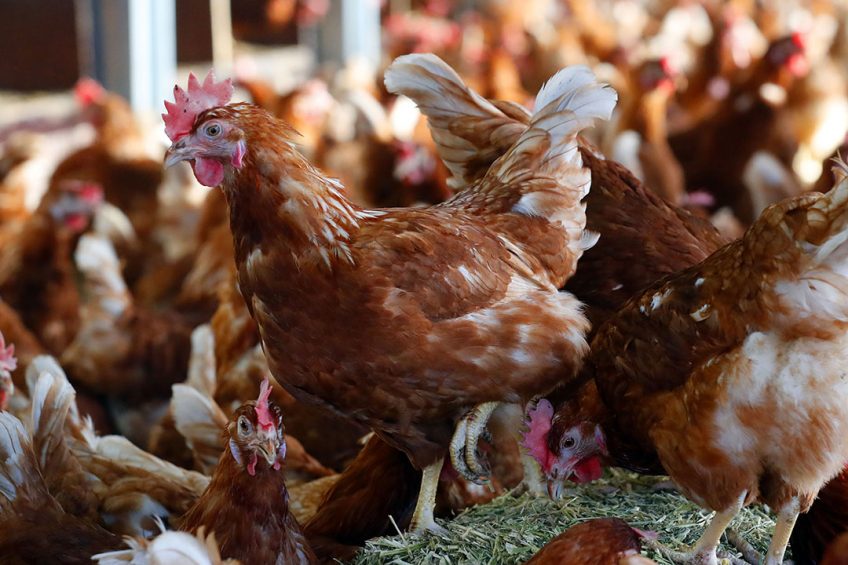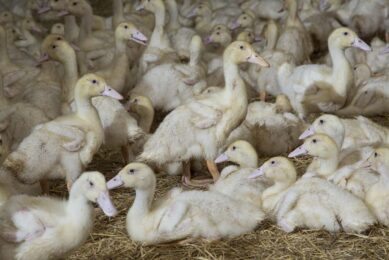Gene editing makes chickens resistant against avian flu

When bird flu is reported, birds within a certain radius must often be culled by law. EggXYt is developing a tool to end this costly practice.
The Israeli company, known for its flagship egg-sexing solution, was founded in late 2016 when co-founder Professor Dani Offen of Tel Aviv University approached Yehuda Elram (CEO) with his idea to use CRISPR, a revolutionary and Nobel Prize-winning gene editing technology, to put an end to the culling of male day-old chicks. The resulting product, seXYt, works by placing a genetic biomarker on the male chromosome of layer chicks. “The beauty of this solution is that the female chicks, which actually reach the market, remain genetically untouched, with DNA identical to the female chicks in the industry today. The biomarker is detectable by our scanner, which serves as a gatekeeper at the entrance of hatcheries.” Co-founder and CEO Yehuda Elram tells Poultry World.
Recently, the company branched out into the field of disease prevention, licencing the GEiGS™ Technology Platform from Tropic Biosciences in a project to develop resistance against avian influenza (AI) in chickens. “Early on, we identified disease prevention in poultry as a problem worth solving,” Elram says. “With AI in particular, whenever an outbreak is reported, typically all birds within a certain radius must be culled by law, regardless of whether or not they have been infected,” he adds. This cruel reality comes with a hefty price tag: “The 2015 US outbreak, for example, led to the deaths of 50 million birds and an economic cost of US$ 3.3 billion. Today, some countries address AI by vaccines and upgraded biosecurity measures, but this is simply not sufficient to prevent all outbreaks,”
“We asked ourselves how we could tackle this challenge,” Elram continues. “We assembled a team of world-class molecular biologists whose expertise lies in gene editing and avian sciences, making them uniquely suited to this task. By using gene editing, our team can give chickens genetic immunity against a host of diseases; in this first instance, that is avian influenza,”

Given their shared interest in gene editing, Elram and his team were closely following Tropic Biosciences’ work. “We seized the opportunity to deploy GEiGS™ ourselves, and this will be the first time that we deploy RNA interference methodologies in a solution of ours. In this case, we will edit genes in the chicken genome that do not code for proteins themselves, but rather regulate the expression of other proteins.
“We will redirect these genes to target the virus itself, preventing it from replicating in the cell. The value of this platform is that the changes made to the genome are minimal; we hope this will accelerate regulatory approval processes and allow us to bring our product to the market,” he continues.
 Avian influenza
Avian influenza
Avian influenza is an issue for poultry producers worldwide. Here Poultry World tracks the outbreaks and keeps you up to date on the latest information.
“From our outlook, we see that governments are embracing gene editing, and even the regions which have traditionally been the least favourable are adapting,” Elram explains, and this rings true: in the UK, the government launched a consultation to loosen restrictions on gene-edited products, and in the EU, past policies are being revised to be more lenient towards gene-edited products.
“We believe gene editing is the future of all breeding. It is faster, more precise, cheaper, and able to do more compared to traditional breeding. Of course, we support its deployment in a safe and regulated fashion and believe it should be approached by regulatory bodies and the public with delicacy and precaution,” Elram continues.
Our solutions promote animal welfare, whether by preventing the cruel practice of chick culling or by preventing the spread of disease, and we believe consumers will see the clear benefit of our solutions and their positive impact on the lives of animals,”
The company previously focused mainly on egg-sexing for the layer market, but is currently branching out into the broiler market as well – and that is not all: “We are developing the egg inspection technologies side of our business to develop additional capabilities for hatcheries, which will be relevant for the broiler industry as well.”
Our vision is to expand not only to other poultry (such as turkeys and ducks) with our genetic solutions, but to eventually expand to other species as well, be it through disease resistance or other applications.”
“We plan to be at the forefront of gene editing-based animal health solutions that will improve animal welfare, change animal protein supply chains, and improve the overall sustainability of this industry,” Elram concludes. “We hope to accomplish this both through internal innovation and through licencing of external technologies for our future pipeline in poultry genetics and other species.”
For more information, visit eggXYt’s website
Join 31,000+ subscribers
Subscribe to our newsletter to stay updated about all the need-to-know content in the poultry sector, three times a week. Beheer
Beheer








 WP Admin
WP Admin  Bewerk bericht
Bewerk bericht